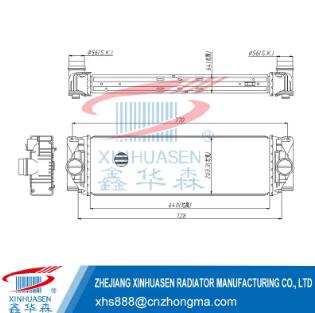The Critical Role of a Car Intercooler in Engine Performance
2024-08-23
Introduction
As automotive technology advances, the intercooler has become a vital component in many high-performance and forced-induction engines. While its primary function may seem straightforward, the intercooler plays a multifaceted role in ensuring that a vehicle’s engine operates at peak efficiency and reliability. In this blog, we’ll explore what an intercooler is, how it works, and why it’s essential for turbocharged and supercharged engines.
What Exactly is an Intercooler?
An intercooler is a heat exchanger used in turbocharged and supercharged engines to cool the air compressed by the turbocharger or supercharger before it enters the engine. By cooling this air, the intercooler increases its density, allowing more oxygen to be packed into the engine's cylinders. The result is a more powerful combustion process, which translates into greater engine power and efficiency.
Intercoolers come in two main types: air-to-air and air-to-water. Air-to-air intercoolers use the ambient air to cool the compressed air, while air-to-water intercoolers use a liquid coolant to absorb the heat from the compressed air. Both types are designed to reduce the temperature of the intake air, but they differ in terms of efficiency, size, and complexity.
How an Intercooler Enhances Engine Performance
The performance of an internal combustion engine relies heavily on the amount of air that can be mixed with fuel in the combustion chamber. Turbochargers and superchargers force more air into the engine, but this process generates significant heat, which can decrease the air's density. Less dense air contains fewer oxygen molecules, leading to less efficient combustion.
An intercooler addresses this issue by cooling the compressed air, increasing its density and oxygen content. This leads to a more complete combustion process, where the engine can burn more fuel and produce more power.
In addition to increasing power, the intercooler also enhances engine efficiency. Cooler air entering the engine means that the combustion process is more controlled, reducing the likelihood of knocking, which occurs when fuel detonates prematurely in the engine’s cylinders. Knocking can lead to engine damage and decreased performance, but an intercooler helps mitigate this risk by ensuring that the intake air remains at an optimal temperature.
The Importance of Intercoolers in Turbocharged and Supercharged Engines
For turbocharged and supercharged engines, the intercooler is not just a performance enhancement; it is a necessity. Without an intercooler, the high temperatures generated by compressed air could lead to a range of issues, including:
1. Reduced Power Output: Hotter air is less dense, which means less oxygen in the combustion chamber and, consequently, less power.
2. Increased Risk of Engine Knock: High intake air temperatures can lead to knocking, which can cause severe engine damage over time.
3. Lowered Engine Efficiency: Without an intercooler, the engine may not be able to maintain the optimal air-fuel ratio, leading to inefficient combustion and wasted fuel.
4. Overheating: The additional heat from uncooled compressed air can strain the engine’s cooling system, leading to overheating and potential engine failure.
Conclusion
The intercooler is a critical component in ensuring the optimal performance and longevity of turbocharged and supercharged engines. By cooling the compressed air before it enters the engine, the intercooler enhances power output, improves efficiency, and protects the engine from potential damage. Whether you’re driving a high-performance sports car or a daily commuter with a turbocharged engine, the intercooler plays an indispensable role in maintaining your vehicle's performance and reliability. Understanding this component’s function is essential for anyone interested in the mechanics of modern automotive technology.



